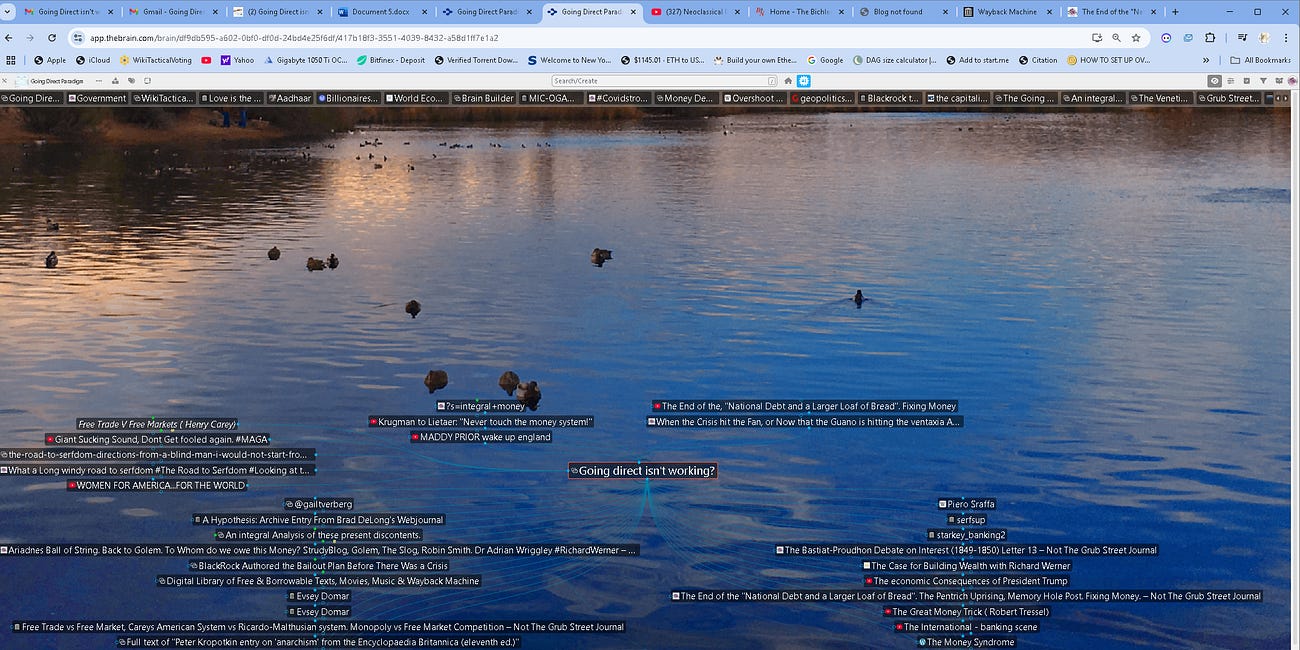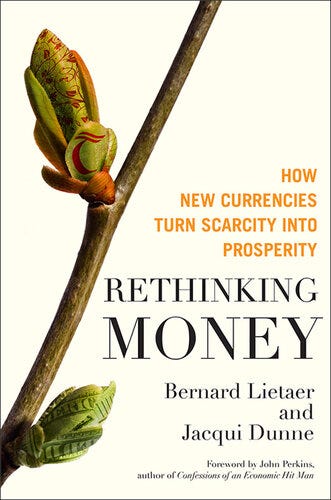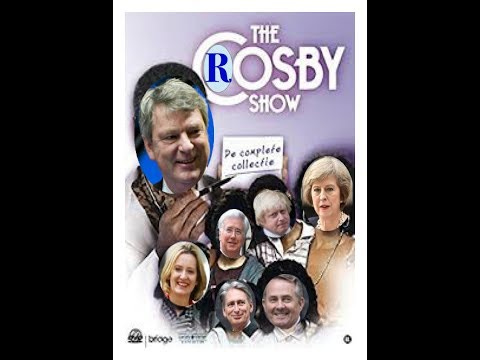Going Direct isn't Working. PART 3
How to Make Our Ideas Clear: An Integral Perspective on Money and Society
How to Make Our Ideas Clear: An Integral Perspective on Money and Society
Introduction
In the spirit of Charles Sanders Peirce, who emphasized the importance of clarity and distinctness in our ideas, this essay seeks to unravel the complex relationship between money, power, and societal structures. We live in a world where financial systems dictate the terms of our existence, often obscuring the underlying truths about wealth distribution and economic stability. This exploration will draw upon historical contexts, philosophical reflections, and contemporary critiques to illuminate how our current monetary practices shape social dynamics and contribute to systemic inequalities.
The Nature of Money
Money is often regarded merely as a medium of exchange, a tool for facilitating trade. However, its deeper implications extend far beyond this simplistic definition. Money embodies power, control, and societal values. As Graeber (2011) points out, money is fundamentally a form of debt, representing claims on future resources and labor. This perspective challenges us to reconsider our understanding of wealth and its distribution.
Historical Context
Historically, monetary systems have evolved alongside societal changes. From the barter systems of ancient civilizations to the complex financial instruments of today, money has always reflected the prevailing values and power structures of its time. The transition from gold-backed currencies to fiat money marked a significant shift, enabling governments to manipulate the money supply and, consequently, the economy at large. This manipulation often leads to cycles of boom and bust, as evidenced by the numerous financial crises throughout history (Kindleberger, 1978).
The Problem of Misallocation and Mispricing of Credit
One of the core issues within modern financial systems is the misallocation and mispricing of credit. As Lietaer (2005) argues, our current monetary framework favors speculation over productive investment, exacerbating wealth inequality. When banks prioritize lending to speculative ventures rather than supporting sustainable businesses, they contribute to an economy that benefits a select few while leaving the majority vulnerable.
The Role of Financial Institutions
Financial institutions have historically played a dual role: facilitating economic growth and perpetuating inequalities. The concentration of power within a few large banks, as noted in the U.S. and U.K. financial sectors, has led to a system where financial elites dictate the terms of economic engagement. This monopolistic behavior stifles competition and innovation, creating an environment ripe for systemic instability.
Wealth Inequality and Economic Disparities
The relationship between money and wealth is deeply intertwined with issues of inequality. The financial sector's growing share of corporate profits—nearly 30% in the U.S. today—highlights a troubling trend where the rich continue to accumulate wealth at the expense of the broader population (The Atlantic, 2023). This disparity is not merely a symptom of economic cycles but a structural issue rooted in the very design of our monetary systems.
The Impact of Monetary Policy
Monetary policies that prioritize the interests of financial institutions over those of ordinary citizens contribute to widening economic disparities. Quantitative easing measures, for instance, have often resulted in inflated asset prices, benefiting those who already hold significant wealth while leaving others behind. As the rich get richer, the poor face increasing barriers to economic mobility, further entrenching cycles of poverty and disenfranchisement.
The Risks of Blurred Policy Boundaries
The integration of fiscal and monetary policies raises critical questions about accountability and governance. When central banks engage in practices that blur the lines between their roles and those of governments, they risk politicizing monetary policy, undermining public trust. This lack of clarity can lead to misguided economic strategies that exacerbate rather than alleviate financial crises.
Lessons from the Past
Historical examples illustrate the dangers of poorly defined monetary policies. The 2008 financial crisis, for instance, was precipitated by a lack of oversight and accountability within the banking sector. As policymakers grappled with the fallout, it became evident that a reevaluation of our monetary practices was necessary to prevent future crises.
Alternative Approaches to Monetary Systems
In light of these challenges, it is crucial to explore alternative monetary systems that prioritize equitable wealth distribution and sustainable economic practices. Community currencies, local banking initiatives, and state sovereign banks offer promising solutions that can mitigate systemic risks associated with traditional financial paradigms.
The Case for Local Currencies
Lietaer and Dunne (2013) advocate for the potential of local currencies to foster economic resilience. By creating alternative monetary systems that operate alongside national currencies, communities can enhance their economic sovereignty and promote local development. These systems have already demonstrated success in various contexts, suggesting that a shift towards decentralized monetary practices is both feasible and necessary.
The Philosophical Implications of Money
At its core, the discussion of money is not merely an economic one; it is deeply philosophical. The nature of money influences our values, behaviors, and relationships. As Varoufakis (2020) notes, money can alienate individuals from one another, reducing complex human interactions to mere transactions. This commodification of relationships poses profound ethical questions about the role of money in shaping our society.
Rethinking Money and Value
To address the challenges posed by our current monetary systems, we must rethink our understanding of money and its role in society. This involves recognizing that money should serve human needs rather than dictate them. By embracing a more holistic view of money—one that incorporates ethical considerations and prioritizes community well-being—we can begin to forge a path towards a more equitable economic future.
Conclusion
In conclusion, the exploration of money and its implications reveals a complex interplay between economic systems, societal values, and individual experiences. By applying Peirce's principles of clarity and distinctness to our understanding of money, we can better navigate the challenges posed by our current financial paradigms. It is imperative that we advocate for alternative monetary systems that promote equity, sustainability, and human flourishing, ultimately reshaping the narrative around money in our society. Only through such transformative efforts can we hope to create a more just and resilient economic landscape for future generations.
All of those listed people are idealists who seek to put lipstick on another lower-yield -- but still unsustainable -- pig. If you want to understand what is ethically possible and not possible in the realm of socioeconomics, then you need to look at the structural civilizational dynamics itself, because socioeconomic theory is an unmoored (from the ecology) fiat endeavor. Anybody not well-grounded in classical cultural anthropology doesn't have a serious say about what civilization should and shouldn't look like. The ecological economists come closest but they're still lacking in some fundamental respects.
reante,
you and I got off on the wrong foot, that said I am grappling with your style of argumentation. My problem not yours. I will try to maintain a neutral tone.
David Graber you may know was an Anthropologist, he wrote debt the first 500o years which also you may have read. He published an article in The Commoner several years before DTFFTY.
The Carnival of Values, and the Exchange Value
of Carnivals
the underside of the Western tradition
At the end of the last chapter I suggested that one reason Nancy Munn’s work has
been so little taken up is that theories that start from action fall so far outside the main
currents of the Western intellectual tradition that it’s hard for most scholars to figure
out exactly what to do with them. They belong, one might say, to the Heraclitean
tradition, which in Western thought has always been somewhat marginal. Western
philosophy, after all, really begins with the quarrel between Heraclitus and
Parmenides; a quarrel that Parmenides won. As a result, from almost the very start,
the Western tradition marked itself by imagining objects that exist, as it were, outside
of time and transformation. So much so that the obvious reality of change has always
been something of a problem.
A question of Freewill V Determinism.
I belong to the Pelagian Free Will tradition. As such .
"Anybody not well-grounded in classical cultural anthropology doesn't have a serious say about what civilization should and shouldn't look like".
Money and how it is done has a profund effect on Society as such I do not agree with you that I am barred from having an opinion and object being told I am unqualified to express it.
To Wit.
Going Direct isn't working
The Price of the chicken most certainly does not come before the egg. Rethinking Money: How New Currencies Turn Scarcity Into Prosperity
I venture the Timonists do not see the paradigm shift, they believe the people are stupid. The cynics of the left, however, do believe the People intelligent enough to become angry. Participative Democracy in Cynical with hope for change the Competing elites model is Timonist which believes that things are as they are. Graeber is very good on this dichotomy with Parmenides and Heraclitus
Abstract
This article critically examines the "Going Direct" financial strategy, as outlined in the BlackRock report from August 2019, juxtaposing it against historical financial crises, particularly the 2008 bailouts. It argues that the current approach blurs the lines between fiscal and monetary policy, effectively creating a system of "socialism for the rich." The analysis highlights the implications of this strategy on wealth inequality, systemic risk, and the broader economic landscape, ultimately contending that such measures may exacerbate existing issues rather than resolve them. By exploring the underlying mechanisms of modern finance, the article aims to illuminate the necessity for a more equitable and sustainable monetary framework.
In all matters epistemological and philosophical I demure ultimately to C S Pierce and this made up quote from ´We Pragmatists ´
CHARLES SANDERS PEIRCE:
´´In order to reason well …. it is absolutely necessary to possess … such virtues as intellectual honesty and sincerity and a real love of truth (2.82). The cause [of the success of scientificinquirers] has been that the motive which has carried them to the laboratory and the field has been a craving to know how things really were … (1-34).[Genuine inquiry consists I in diligent inquiry into truth for truth’s sake(1.44), … in actually drawing the bow upon truth with intentness in the eye, with energy in the arm (1.235). [When] it is no longer the reasoning which determines what the conclusion shall be, but … the conclusion which determines what the reasoning shall be … this is sham reasoning…. The effect of this shamming is that men come to look upon reasoning as mainly decorative…´´. web.ncf.ca/ag659/308/Pe… seminal essay How to make our ideas clear is also a great starting off point for embracing such truth as we might be fortunate enough to encounter in our allotted time on this blue marble suspended in eternity.
Abstract
This article critically examines the "Going Direct" financial strategy, as outlined in the BlackRock report from August 2019, juxtaposing it against historical financial crises, particularly the 2008 bailouts. It argues that the current approach blurs the lines between fiscal and monetary policy, effectively creating a system of "socialism for the rich." The analysis highlights the implications of this strategy on wealth inequality, systemic risk, and the broader economic landscape, ultimately contending that such measures may exacerbate existing issues rather than resolve them. By exploring the underlying mechanisms of modern finance, the article aims to illuminate the necessity for a more equitable and sustainable monetary framework.
In all matters epistemological and philosophical I demure ultimately to C S Pierce and this made up quote from ´We Pragmatists ´
CHARLES SANDERS PEIRCE:
´´In order to reason well …. it is absolutely necessary to possess … such virtues as intellectual honesty and sincerity and a real love of truth (2.82). The cause [of the success of scientificinquirers] has been that the motive which has carried them to the laboratory and the field has been a craving to know how things really were … (1-34).[Genuine inquiry consists I in diligent inquiry into truth for truth’s sake(1.44), … in actually drawing the bow upon truth with intentness in the eye, with energy in the arm (1.235). [When] it is no longer the reasoning which determines what the conclusion shall be, but … the conclusion which determines what the reasoning shall be … this is sham reasoning…. The effect of this shamming is that men come to look upon reasoning as mainly decorative…´´. http://web.ncf.ca/ag659/308/Peirce-Rorty-Haack.pdfPierces seminal essay How to make our ideas clear is also a great starting off point for embracing such truth as we might be fortunate enough to encounter in our allotted time on this blue marble suspended in eternity.
http://www.peirce.org/writings/p119.html
https://gailtverberg.substack.com/p/economic-contraction-coming-right/comment/121715806
Is the Dollar being devalued by stealth. That old trilemma. The economic consequences of President Trump.
‘The flak is heaviest when you are over the target!’
The Economic consequences of President Trump.
The Economic consequences of President Trump. Is the Dollar being devalued by stealth. That old trilemma











Then Reason really doesn't mean that much to you. Reason is all we have because it is the accurate patterning of cause and effect, and cause and effect is all that the universe has.
I'm not a fan of Tim Morgan either. He kicked me out too in short order because he fears systematic (Socratic) reasoning, and prefers to cosplay up on his little soapbox in front of his followers. What else is new?
Gail's a good woman who's willing to change and grow in Reason despite her years. That's a rarity. I recommend that you lurk at her main site. Systems theory takes awhile.
Graeber was not an anthropologist. Graeber was the CIA plant who's purpose was to help hijack 21st century anthropology into oblivion because the Elites realizedback in the 70s 80s and 90s that classical cultural anthropology had turned out to be the only truly subversive field. Understand that the true field of cultural anthropology is the study of deep ecology and is structurally anti-civilization because whoever looks deep into it's hegemonic nature feels revulsion. Graeber's entire political purpose was to make people like yourself, who haven't thoroughly studied the likes of Marvin Harris and Robin Dunbar, believe that a better, and indeed worthy, civilization can be just around the corner. He is not an anthropologist because he only studied civilizational history. He studiously avoided hunter gatherer societies which are the foundation of the field because we can only know the nature of humans when they are free from political control.